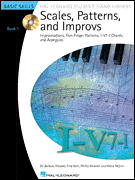One teacher at the Kansas City workshop in November asked me this question on a comment card. I think this is a great question since at several points in my Composition for Kids lecture, I mention that I encourage doodling. First, let me make a few points about doodling.
I think there is a difference between doodling with a purpose and doodling to fill space or delay working. Some students would doodle their entire lesson for a variety of reasons, but not necessarily to come up with some great motive for a future composition. So, I think it is important to try to determine why this particular student is constantly doodling. Is he bored? Is he delaying what he doesn’t want to do? Is she looking for a creative sound? Is she anxious to create something new? Finding the answer to these questions will help you know how to deal with constant doodling.
If a student is doodling because he is bored, then I would suggest alternating time at the bench with time away from the bench playing a variety of music games. Some great sites for music games are Piano Teaching Resources and D’Net Layton’s Site of music games. You can also find some music games to make and play here on my website.
If a student is doodling because she likes to create new sounds, then it is a good idea to set aside some lesson time to allow her to do this. For example, you could tell her, “Susan if you will do what I ask for the next 10 minutes, then you can spend 5 minutes doodling around the piano. Then, when she applies herself for those 10 minutes, make sure that you indeed allow her 5 minutes and even encourage her doodling by telling her what you like and even how to build on her good ideas.
Another suggestion for the creative student is to encourage them to “doodle with a purpose.” For instance, sometimes after a student has performed a piece, I ask them to doodle around to create an alternate ending for the piece. During that time, I write in their lesson plan book and I know their doodling will have a purpose. Of course, it is important to ask them to play their creation and comment on it before you move on.
 You can also ask student to doodle or improvise using the scale they just performed for you. The Scales, Chords, and Improvs book has a great fully orchestrated accompaniment CD which you can turn on for the student while they improvise.
You can also ask student to doodle or improvise using the scale they just performed for you. The Scales, Chords, and Improvs book has a great fully orchestrated accompaniment CD which you can turn on for the student while they improvise.
If a student is constantly doodling because they just don’t want to do what you ask, then I suppose an entirely problem is really occurring and some serious conversations with the student and parent need to take place. However, I find that in most cases, the students who doodle just love to create and if you give your student opportunities to doodle and acknowledge their good efforts at and results in doodling, then you may notice the student will then give YOU an opportunity to “have your say.”
To see other questions in this series:
